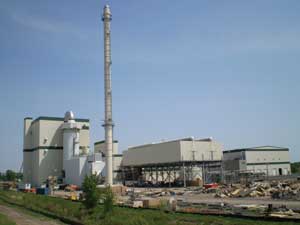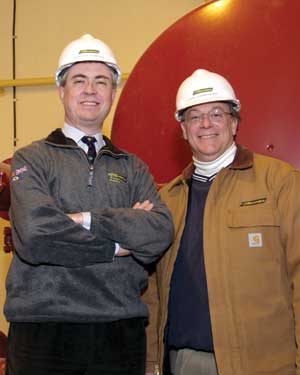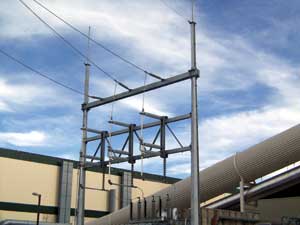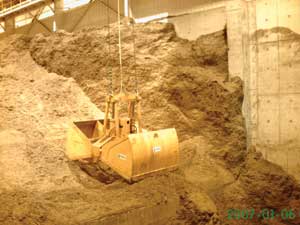Generating Poultry Power













Invalid Date
BY Ron Kotrba
There's a small community of 3,400 people on the edge of the northern plains whose residents have grown accustomed to outsiders and the press. Some people come to Benson, Minn., to see the Chippewa Valley Ethanol Co. plant on the outskirts of town, where routine production sometimes stops so the facility can distill top-shelf spirits like Shaker's vodka. That same refinery also attracts those who want to learn more about its pilot gasifier, where corn stover, straw and soybean stubble can all be used to replace natural gas. But there's more to Benson's renewable reach than the ethanol plant.
Farms across the Land of 10,000 Lakes raise more than 45 million turkeys a year. Jennie-O Turkey Store Inc. has more than 100 farms in Minnesota and Wisconsin, and six turkey-processing plants in Minnesota. According to the Minnesota Turkey Growers Association, 75 to 80 pounds of feed is needed to produce one 30-pound turkey. "That feed not remaining in the turkey flesh has got to go somewhere, now doesn't it?" says Rupert Fraser, CEO of Homeland Renewable Energy LLC, a New Hampshire-based holding company with roots in the United Kingdom. For every pound of turkey meat, there's roughly one-and-a-half pounds of manure produced. In Minnesota, those 45 million turkeys dish out a million tons of litter a year. Poultry litter consists of excrement from the birds, plus wayward feed, feathers and wood particles from bedding. Fibrominn LLC, a Benson-based power plant, recently started using this plentiful waste as its fuel. At 55-megawatts (MWs), it's the largest poultry-litter-fired power plant in the world, and the first of its kind in the United States.
The technologies being implemented at Fibrominn to effectively combust alkaline-rich poultry wastes, properly handle and condition the material, and contain the powerful odor, were not developed on the fly. It was the culmination of 15 years of work originating in the U.K., where people from Benson traveled to understand more completely how this type of a plant affects the surrounding community. Now that Fibrominn is operational, people with stakes in other large U.S. poultry regions are flocking to this northern town in the heart of turkey country to get a closer look at the facility.
From Union Jack to Stars and Stripes
Herbaceous biomasses have fueled boilers for a long time. Animal wastes like poultry litter have a different makeup, however, that cause fouling and slagging during the combustion process. "Animal biomass is more alkaline," Fraser says. "Alkalines behave differently under high temperatures-they get sticky and foul up with ash … many who have tried to combust, gasify or heat-treat animal manures have found significant challenges." In 1989, Rupert Fraser and his father, Simon, set out to overcome these challenges. In doing so, they changed the way people think of power and stinky poultry litter.
The elder Fraser's experience in forest residue combustion in Scotland, and family ties with a United Kingdom turkey farmer, were the basis of the proprietary technologies used in Benson. "We didn't design the fuel to fit the plants, we designed the plants to fit the fuel," says Rupert Fraser, referring to the three power plants he and his father engineered in the United Kingdom during the ‘90s. The United Kingdom plants, which collectively produce 64.7 MWs of power, are all still running but no longer owned by the father and son team. The dissolution took place in 2002. Rupert Fraser relocated across the pond, where he started Homeland Renewable Energy, a holding company for Fibrowatt LLC-the project development arm using advancements in those same technologies Fraser brought with him from the United Kingdom.
Building in Benson
It was only natural for Fibrowatt to build its first U.S. plant in Minnesota, even though there are several other large poultry production regions in the United States. According to Carl Strickler, Fibrowatt's vice president and COO, the company has projects under development in Arkansas, Maryland, Mississippi, Alabama, Georgia and North Carolina. But in the end it was Minnesota that had all the right attractions.
"It's a turkey-dominated region," says Fraser, speaking of Minnesota and specifically of Benson. "It's also sufficiently forward thinking, and there's strong enthusiasm and desire there to see alternatives put to good use." The state has a biomass mandate that was pushed through the 1994 legislature, which made Benson an attractive site indeed. Approximately half of the state's electricity is provided by Xcel Energy, which is required to acquire 110 MWs of biomass-derived power. The Fibrominn developers inked a long-term energy supply agreement through a subsidiary of Xcel, Northern States Power Co., contingent upon its startup. The security of the power purchase agreement facilitated the fundraising efforts to begin building in Benson. Fraser says the company arranged $202 million in a 20-year debt-arrangement, taken on by a consortium of insurance companies: John Hancock, Prudential and Metropolitan Life.
Before the plant could be built, city officials needed to make sure that it would be a good neighbor. "The city has been working with the company for eight years," says Benson City Manager Rob Wolfington. Early on, a small team of city officials went to tour the three United Kingdom plants. One of the main concerns the Benson community initially had was that of the smell; poultry litter is stinky stuff. "There were no odor issues associated with those plants," he says. "Some in the surrounding communities weren't even aware there was a power plant using poultry litter as fuel." Even so, the company was sensitive to Benson's concerns. "We keep a close relationship with the community," says Terry Walmsley, Fibrowatt's vice president of environmental and public affairs. "We set up a citizen's advisory panel where these types of things are discussed."
Conventional or otherwise, a power plant must be positioned near adequate infrastructure. "It has to be near transmission lines and a substation," Wolfington says. "Benson and its electrical infrastructure met the technical standards needed." A 12.2 MW city power plant already in Benson helped seal the deal for Fibrominn, which chose a site adjacent to the ethanol plant. It took two years of permitting in "the land of 10,000 permits," Wolfington quips, in addition to public hearings. Subsequently, the citizen's panel unanimously approved locating the plant in Benson. "We spoke Fibrowatt's language," he says.
Litter Procurement, Odor and Process
Turkey farmers, who also produce corn, soybeans and other crops, use the turkey litter as fertilizer because of its nutritive value. However, many turkey farmers produce more litter than they can use, which can cause environmental problems if too much is spread on the fields. "Poultry litter is good to spread, but you can't have too much of a good thing-otherwise, it's not good," Fraser says.
Walmsley says Fibrominn pays about $2 a ton for the turkey litter depending on its moisture content and ash characteristics. On average, poultry litter contains about 4,000 British thermal units per pound. The 55 MW Fibrominn plant, once running at full capacity, is expected to consume 2,000 to 2,500 tons of poultry litter a day. "We recognize some farmers will still want the litter for a soil amendment, that's why we are only going after the excess litter," Walmsley says. A majority of the feedstock required is under long-term contract with groups of poultry farmers. Approximately 50 percent of Fibrominn's feedstock will come from the area surrounding the plant. The rest will be trucked in from about a 100-mile radius of the facility, which will be dictated by the availability of the fluctuating supply, Walmsley says. Project developers believe that in purchasing the excess litter, they are providing a valuable service to the poultry industry and the environment. It reduces the regulatory burden on the poultry farmers; lessens the risk of contaminating water supplies from too much phosphorous and nitrogen; improves biosecurity; reduces cleanout costs, and adds a couple of dollars per ton to the farmer's bottom line. Since poultry waste originates in grains, its carbon impact in the atmosphere is low, especially when it's compared with a coal-fired power plant.
Although odor is hard to regulate in a permit, Fibrominn operates smartly to keep the stench at bay. "The best way to avoid odor is to contain it," Walmsley tells Biomass Magazine. Beginning when the turkey litter is picked up, the trucks are covered with tight-fitting tarps and the loads are hauled on the right routes reducing odor release significantly. Once on-site, the litter is treated for three to five days to optimize the burn. From the fuel storage hall the litter is fed into the Foster-Wheeler-designed boiler by mechanical distribution. "Poultry litter is very difficult to move and manage because of the characteristics, if you will," Strickler says. Fifteen years of experience has taught Fibrowatt irreplaceable proprietary secrets in handling and combusting poultry litter. In moving the litter from the fuel hall to the boiler, negative pressure draws air inward to the facility. Inside air pressure is lower than it is outside, so air rushes into the plant and, therefore, doesn't allow the odor to escape the vicinity. The incoming draft air helps the litter burn in the grate-fired boiler-a single-drum steam generator type. The high-pressure boiler steam then goes into a direct-drive steam turbine/generator combo. Urea injections treat nitrogen oxide emissions, and the flue gas undergoes additional treatment before leaving the boiler. Additional management occurs as the gases enter the scrubber and baghouse.
The resulting ash-80,000 to 100,000 tons from firing approximately 700,000 tons of biomass a year-is sold to North American Fertilizer LLC, which is adjacent to Fibrominn. "A conveyer belt takes the ash to a 60,000 or 70,000 square-foot building, where it's stored, conditioned and made into fertilizers," Fraser tells Biomass Magazine. "This helps restore an environmental balance-not wasting, but recycling. The ash is a great fertilizer. All farmers are chemists today. They know what the land needs. There will be no shortage of customers for the ash."
Onlookers may see this business model and assume that Fibrominn's customer base is the poultry industry. True enough, but the utility companies seeking to purchase renewable energy, voluntarily or under mandate, are also valuable customers. "Some say, ‘This is a turkey-litter plant,'" Wolfington says. "We say, ‘No, it's a power plant using turkey litter as fuel.'"
Ron Kotrba is a Biomass Magazine staff writer. Reach him at rkotrba@bbibiofuels.com or (701) 746-8385.
Farms across the Land of 10,000 Lakes raise more than 45 million turkeys a year. Jennie-O Turkey Store Inc. has more than 100 farms in Minnesota and Wisconsin, and six turkey-processing plants in Minnesota. According to the Minnesota Turkey Growers Association, 75 to 80 pounds of feed is needed to produce one 30-pound turkey. "That feed not remaining in the turkey flesh has got to go somewhere, now doesn't it?" says Rupert Fraser, CEO of Homeland Renewable Energy LLC, a New Hampshire-based holding company with roots in the United Kingdom. For every pound of turkey meat, there's roughly one-and-a-half pounds of manure produced. In Minnesota, those 45 million turkeys dish out a million tons of litter a year. Poultry litter consists of excrement from the birds, plus wayward feed, feathers and wood particles from bedding. Fibrominn LLC, a Benson-based power plant, recently started using this plentiful waste as its fuel. At 55-megawatts (MWs), it's the largest poultry-litter-fired power plant in the world, and the first of its kind in the United States.
The technologies being implemented at Fibrominn to effectively combust alkaline-rich poultry wastes, properly handle and condition the material, and contain the powerful odor, were not developed on the fly. It was the culmination of 15 years of work originating in the U.K., where people from Benson traveled to understand more completely how this type of a plant affects the surrounding community. Now that Fibrominn is operational, people with stakes in other large U.S. poultry regions are flocking to this northern town in the heart of turkey country to get a closer look at the facility.
From Union Jack to Stars and Stripes
Herbaceous biomasses have fueled boilers for a long time. Animal wastes like poultry litter have a different makeup, however, that cause fouling and slagging during the combustion process. "Animal biomass is more alkaline," Fraser says. "Alkalines behave differently under high temperatures-they get sticky and foul up with ash … many who have tried to combust, gasify or heat-treat animal manures have found significant challenges." In 1989, Rupert Fraser and his father, Simon, set out to overcome these challenges. In doing so, they changed the way people think of power and stinky poultry litter.
The elder Fraser's experience in forest residue combustion in Scotland, and family ties with a United Kingdom turkey farmer, were the basis of the proprietary technologies used in Benson. "We didn't design the fuel to fit the plants, we designed the plants to fit the fuel," says Rupert Fraser, referring to the three power plants he and his father engineered in the United Kingdom during the ‘90s. The United Kingdom plants, which collectively produce 64.7 MWs of power, are all still running but no longer owned by the father and son team. The dissolution took place in 2002. Rupert Fraser relocated across the pond, where he started Homeland Renewable Energy, a holding company for Fibrowatt LLC-the project development arm using advancements in those same technologies Fraser brought with him from the United Kingdom.
Building in Benson
It was only natural for Fibrowatt to build its first U.S. plant in Minnesota, even though there are several other large poultry production regions in the United States. According to Carl Strickler, Fibrowatt's vice president and COO, the company has projects under development in Arkansas, Maryland, Mississippi, Alabama, Georgia and North Carolina. But in the end it was Minnesota that had all the right attractions.
"It's a turkey-dominated region," says Fraser, speaking of Minnesota and specifically of Benson. "It's also sufficiently forward thinking, and there's strong enthusiasm and desire there to see alternatives put to good use." The state has a biomass mandate that was pushed through the 1994 legislature, which made Benson an attractive site indeed. Approximately half of the state's electricity is provided by Xcel Energy, which is required to acquire 110 MWs of biomass-derived power. The Fibrominn developers inked a long-term energy supply agreement through a subsidiary of Xcel, Northern States Power Co., contingent upon its startup. The security of the power purchase agreement facilitated the fundraising efforts to begin building in Benson. Fraser says the company arranged $202 million in a 20-year debt-arrangement, taken on by a consortium of insurance companies: John Hancock, Prudential and Metropolitan Life.
Before the plant could be built, city officials needed to make sure that it would be a good neighbor. "The city has been working with the company for eight years," says Benson City Manager Rob Wolfington. Early on, a small team of city officials went to tour the three United Kingdom plants. One of the main concerns the Benson community initially had was that of the smell; poultry litter is stinky stuff. "There were no odor issues associated with those plants," he says. "Some in the surrounding communities weren't even aware there was a power plant using poultry litter as fuel." Even so, the company was sensitive to Benson's concerns. "We keep a close relationship with the community," says Terry Walmsley, Fibrowatt's vice president of environmental and public affairs. "We set up a citizen's advisory panel where these types of things are discussed."
Conventional or otherwise, a power plant must be positioned near adequate infrastructure. "It has to be near transmission lines and a substation," Wolfington says. "Benson and its electrical infrastructure met the technical standards needed." A 12.2 MW city power plant already in Benson helped seal the deal for Fibrominn, which chose a site adjacent to the ethanol plant. It took two years of permitting in "the land of 10,000 permits," Wolfington quips, in addition to public hearings. Subsequently, the citizen's panel unanimously approved locating the plant in Benson. "We spoke Fibrowatt's language," he says.
Litter Procurement, Odor and Process
Turkey farmers, who also produce corn, soybeans and other crops, use the turkey litter as fertilizer because of its nutritive value. However, many turkey farmers produce more litter than they can use, which can cause environmental problems if too much is spread on the fields. "Poultry litter is good to spread, but you can't have too much of a good thing-otherwise, it's not good," Fraser says.
Walmsley says Fibrominn pays about $2 a ton for the turkey litter depending on its moisture content and ash characteristics. On average, poultry litter contains about 4,000 British thermal units per pound. The 55 MW Fibrominn plant, once running at full capacity, is expected to consume 2,000 to 2,500 tons of poultry litter a day. "We recognize some farmers will still want the litter for a soil amendment, that's why we are only going after the excess litter," Walmsley says. A majority of the feedstock required is under long-term contract with groups of poultry farmers. Approximately 50 percent of Fibrominn's feedstock will come from the area surrounding the plant. The rest will be trucked in from about a 100-mile radius of the facility, which will be dictated by the availability of the fluctuating supply, Walmsley says. Project developers believe that in purchasing the excess litter, they are providing a valuable service to the poultry industry and the environment. It reduces the regulatory burden on the poultry farmers; lessens the risk of contaminating water supplies from too much phosphorous and nitrogen; improves biosecurity; reduces cleanout costs, and adds a couple of dollars per ton to the farmer's bottom line. Since poultry waste originates in grains, its carbon impact in the atmosphere is low, especially when it's compared with a coal-fired power plant.
Although odor is hard to regulate in a permit, Fibrominn operates smartly to keep the stench at bay. "The best way to avoid odor is to contain it," Walmsley tells Biomass Magazine. Beginning when the turkey litter is picked up, the trucks are covered with tight-fitting tarps and the loads are hauled on the right routes reducing odor release significantly. Once on-site, the litter is treated for three to five days to optimize the burn. From the fuel storage hall the litter is fed into the Foster-Wheeler-designed boiler by mechanical distribution. "Poultry litter is very difficult to move and manage because of the characteristics, if you will," Strickler says. Fifteen years of experience has taught Fibrowatt irreplaceable proprietary secrets in handling and combusting poultry litter. In moving the litter from the fuel hall to the boiler, negative pressure draws air inward to the facility. Inside air pressure is lower than it is outside, so air rushes into the plant and, therefore, doesn't allow the odor to escape the vicinity. The incoming draft air helps the litter burn in the grate-fired boiler-a single-drum steam generator type. The high-pressure boiler steam then goes into a direct-drive steam turbine/generator combo. Urea injections treat nitrogen oxide emissions, and the flue gas undergoes additional treatment before leaving the boiler. Additional management occurs as the gases enter the scrubber and baghouse.
The resulting ash-80,000 to 100,000 tons from firing approximately 700,000 tons of biomass a year-is sold to North American Fertilizer LLC, which is adjacent to Fibrominn. "A conveyer belt takes the ash to a 60,000 or 70,000 square-foot building, where it's stored, conditioned and made into fertilizers," Fraser tells Biomass Magazine. "This helps restore an environmental balance-not wasting, but recycling. The ash is a great fertilizer. All farmers are chemists today. They know what the land needs. There will be no shortage of customers for the ash."
Onlookers may see this business model and assume that Fibrominn's customer base is the poultry industry. True enough, but the utility companies seeking to purchase renewable energy, voluntarily or under mandate, are also valuable customers. "Some say, ‘This is a turkey-litter plant,'" Wolfington says. "We say, ‘No, it's a power plant using turkey litter as fuel.'"
Ron Kotrba is a Biomass Magazine staff writer. Reach him at rkotrba@bbibiofuels.com or (701) 746-8385.
Advertisement
Advertisement
Upcoming Events





